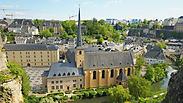
Majority of Jews reside in Luxembourg City
Shutterstock
Shalom, Luxembourg: Jewish culture guide
Although small in numbers, Luxembourg's Jewish community is proud yet well integrated into society. With a lengthy history, spanning well over a millennium, this small European country is definitely worth a visit
With its official title, the Grand-Duchy of Luxembourg, this small European nation is the only remaining grand duchy (meaning its head of state is a monarch) in the world.
Founded in 963 by Count Siegfried as the "fortress of Luxembourg," the first record of a Jewish community in the capital, Luxembourg, dates to 1276. Over the next half century, there was an influx of Jewish immigration to the country, mainly from the German city of Trier. As the Black Death ravaged Europe during the mid-14th century, Jews in Luxembourg (as elsewhere on the Continent) were blamed for the devastation.
In the towns of Luxembourg and Echternach, Jews were expelled or murdered. By 1391, the entire Jewish population of the country was expelled. However, by the beginning of the 15th century, some Jews had returned. Yet, the peace was short-lived. In 1530, again there was a mass expulsion of the Jews in Luxembourg, save for a few conversos. It wouldn’t be until the Napoleonic era of the late 18th century, that Jews were permitted to return to the country.
In 1815, Luxembourg gained its independence from the French Empire. By 1823, the first synagogue was built in the country, located in the capital. Luxembourg’s first rabbi, Samuel Hirsch, was known as the father of Reform Judaism and served betwixt 1843 to 1866.
Over the next few decades, the Jewish population steadily increased to roughly 450 people in 1880. By the 1894, the first Great Synagogue was constructed in the capital, and a second synagogue was built in Esch-sur-Alzette in 1899. The Jewish population surged in the 1930’s to approximately 4,000, as refugees fled Nazi oppression in neighboring Germany.
In May 1940, Germany invaded Luxembourg. Consequently, 50,000 Luxembourgers (including over 1,500 Jews) fled the country during World War II. In total, an estimated 1,945 Luxembourg Jews lost their lives during the Holocaust.
After World War II, some 1,500 Jews returned to the country, the majority being merchants who wished to rebuild their businesses. Unfortunately, both the country’s synagogues were destroyed during the war. However, with financial support from the government, the community rebuilt The Great Synagogue of Luxembourg in 1953, and likewise, the Canal Synagogue in Esch-sur-Alzette a year later.
Today, of Luxembourg’s estimated 537,853 total population, 1,200 are Jewish. The majority resides in Luxembourg City, with a smaller group living in Esch-sur-Alzette. The Consistoire Israelite de Luxembourg (Jewish community of Luxembourg) represents the community in government, and serves as the community’s governing body. The Great Synagogue in Luxembourg City provides modern Orthodox services, whilst the synagogue in Esch-sur-Alzette is non-denominational. There is also a Chabad Lubavitch located in Luxembourg City.
Keeping kosher in Luxembourg can prove difficult, as no kosher food is locally. However, Chabad does provide a list of shops that sell kosher products. In addition to the country’s two synagogues, another site of Jewish interest is the Old Cemetery, located on Rue Jule Wilhelm (Passage de Treves).
Although small in numbers, the Jewish community of Luxembourg is proud, yet well integrated into society. With a lengthy history, spanning well over a millennium, Luxembourg is definitely worth a visit.
Reprinted with permission from Shalom Life










